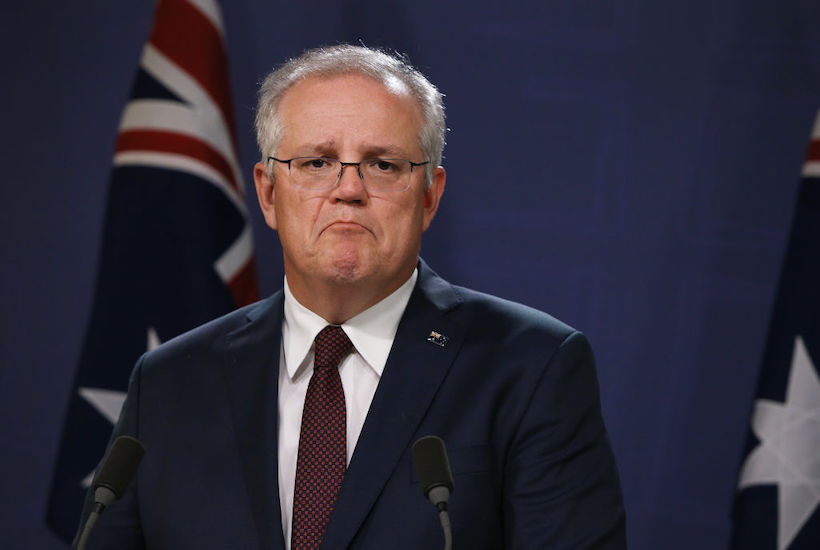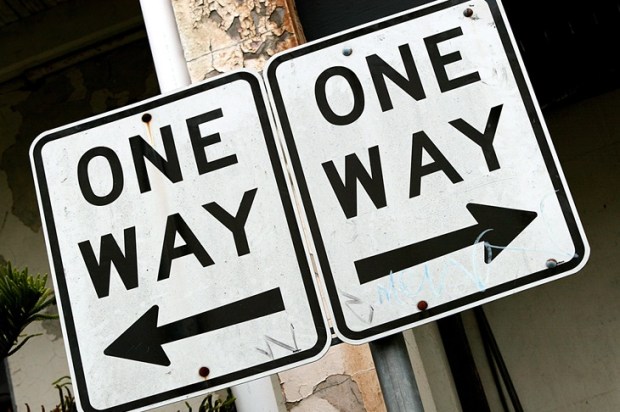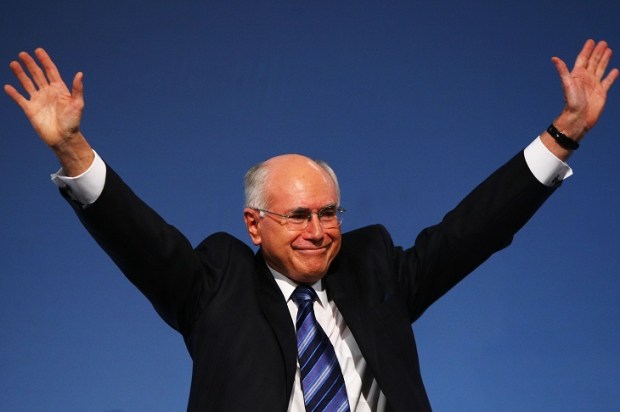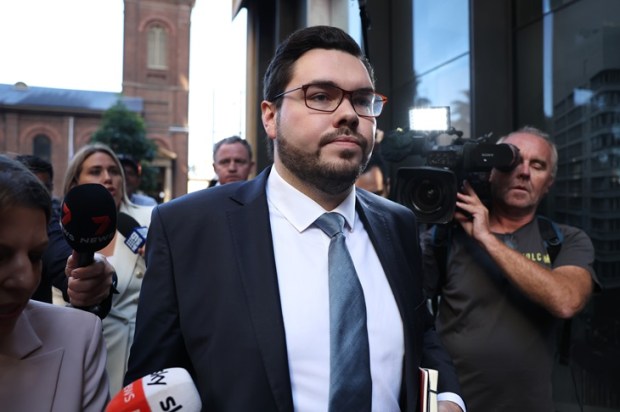The federal parliament’s pre-Budget recess carries with it crucial significance this year. It comes at a time when the Morrison Government has been trapped in a maelstrom of extremely bad press, following the poisonous Brittany Higgins/Christian Porter/Andrew Laming issues. Add in the disastrous New South Wales floods, the Liberals’ annihilation in the Western Australian election, another Brisbane lockdown by a power-drunk, fearmongering state premier and the Prime Minister will probably welcome a break from parliamentary scrutiny, particularly in light of two Newspolls showing his government behind Labor — even though the end of JobKeeper may mean worse is still to come.
The biggest problem for the Prime Minister, however, is that he need look no further than himself to find many of the reasons for his government’s travails. As The Spectator Australia noted in its editorial on 20 March, just a fortnight ago, the unfortunate reality is that if you don’t always stand on points of principle and fight for values – such as the presumption of innocence or the importance of individual responsibility – when you have the leeway to do so, then you won’t get the opportunity to when you don’t.
November 28 last year marked the thirtieth anniversary of Margaret Thatcher’s resignation as prime pinister. Her success in government, along with that of Ronald Reagan, centred on the implementation of core conservative ideals: lower taxes, smaller government, reward for individual effort, defence of the family and the importance of: national sovereignty, the rule of law and, above all, individual liberty.
For most of his public life, John Howard affirmed how he was inspired by Reagan and Thatcher’s conservatism. This was not always convenient for him, especially during his time as opposition leader in the 1980s, when Mr Howard not only had Bob Hawke as an adversary, but troubles within his own party and the Nationals. He had to contend with constant leaking and undermining by his colleagues (Tony Abbott would know how that feels), and the “beauty contest” polls at the time showed the results of this disloyalty and challenging economic environment. May will recall the famous front cover of the now-defunct Bulletin from the end of 1988 with tis: “Mr 18%. Why on earth does this man bother?” caption. However, determined in his view that “it is better to be right than popular”, and despite being disgracefully dumped by his colleagues as leader in 1989 — and then rejected in 1990, 1993 and 1994 after the Peacock loss and Hewson fiasco — Howard never wavered from articulating policies that embodied the abovementioned conservative ideals. This determination led him to become Australia’s second-longest serving prime minister after Sir Robert Menzies.
Menzies believed that the progress of this country depended more on personal freedom rather than security provided by the State. He outlined this as one of the founding principles of the Liberal Party. In the well-known “Melbourne Address” of 7 September 1947, Menzies declared:
If we fought for freedom, and as we fought for it, did we secure it? Are we pursuing paths along which we will eventually end up by finding ourselves bond, or free? Why was it that in 1939 we said that the Germans were not free… It consisted in that the German people, in return for that mess of pottage, had handed over to a few men their birthright and said: “You rule us, you govern us, you order us”.
In 1964, Reagan delivered his famous “A time for choosing” speech, where he outlined the importance of individual liberty:
This is the issue… whether we believe in our capacity for self-government or whether we abandon the American Revolution and confess that a little intellectual elite in a far-distant capital can plan our lives for us better than we can plan them ourselves.
Indeed, in his 1981 Inauguration Address, President Reagan declared: “In this present crisis, government is not the solution to our problem; government is the problem.”
Upon becoming Conservative Party leader in 1975, Thatcher outlined her vision of a free society:
A man’s right to work… to spend what he earns, to own property, to have the state as servant and not as master… They are the essence of a free economy. And on that freedom all our other freedoms depend.
Throughout her prime ministership, Thatcher held steadfast to this vision. Criticised by weak-kneed colleagues who implored her to make a U-turn on free-market policies, she declared at the 1980 party conference: “You turn if you want to. The Lady’s not for turning”. In defence of individual freedom and the rule of law, she took on and defeated militant unions. In making cuts to profligate government spending, she reminded Britons that the socialists will eventually run out of other people’s money. Thatcher warned Britain repeatedly of the dangers of the distant Brussels elite having too much power and the threat this posed to democracy. Some 26 years after she left office, Britons realised Thatcher was right and voted to leave the EU. Her and Reagan’s resoluteness in the face of the Soviet Union’s aggression led to the fall of the Berlin Wall in 1989.
Unfortunately, Scott Morrison appears to be doing everything in his power to disavow core conservative values, with disastrous effects.
A Centre for Independent Studies paper on the response of Australian governments to coronavirus reported in these pages last December found that they ignored their own advice, instead whipping up fear with incoherent and unjustified restrictions. In Victims of Failure – how the COVID-19 policy response let down Australians, Monica Wilkie argued that governments did not analyse trade-offs that included soaring public debt, unemployment and mental health problems.
“Measures for fighting coronavirus must be justified and proportionate, and individual liberty must always be protected; these are the very standards governments set themselves in their pandemic influenza plans,” Wilkie stated, noting that principles of good governance and democracy had been ignored.
The Prime Minister has acquiesced in the trampling of fundamental rights and freedoms by consistently supporting state government imposed lockdowns. His support of Daniel Andrews was particularly contemptible, especially when he told the parliament it was the “right decision of the Victorian Premier” to impose draconian lockdown measures. His egregious silence following the arrest of Zoe Buhler in her own home for daring to question these measures speaks volumes. This attitude is consistent with the PM’s past statements on his lack of belief in the importance of free speech in a thriving liberal democracy.
The Morrison government had an opportunity to put an end to the border closure madness last year with Clive Palmer’s High Court challenge. Rather than stand up for the Constitution and rule of law, along with the Liberal Party’s main constituency, small businesses, they meekly withdrew from the action. There lack of will was exposed by comments from Professor George Williams in an interview on Sky News Australia in November that the Commonwealth has various options that could be explored to override the states on borders, be it through the Biosecurity legislation or possibly under the External Affairs power, to guarantee freedom of movement of citizens.
As Professor James Allan wrote in the Spectator Australi in March: “Don’t tell me the s.92 High Court borders case (another poor effort from our top justices) would have had the same outcome even if the feds had stayed involved. Leaving it all to Palmer made it easy for our High Court. If the federal government doesn’t care about borders why should the seven top judges?”
When he is not staying silent, Scot Morrison resorts to glib statements to try to get himself out of trouble, a tactic honed in his marketing career. In his new year’s message to the nation, the Prime Minister had plenty to say about national unity and how actions speak louder than words. He repeated his ‘one and free’ refrain on Australia Day, a unilateral change to the national anthem which, to use his own words, ‘doesn’t create a single job’, but has all the hallmarks of placating the mob.
This, of course, is the same mob that laid the Christine Holgate trap which Scotty from Marketing fell for so easily. The same mob from the ABC and SBS which is hell-bent on destroying anybody who doesn’t agree with their Green-left view of the world, which the government continues to fund. Morrison stand on the cusp of falling prey to insidious identity politics, grovelling to appease it by supporting female quotas. The Prime Minister could do worse than to heed Peta Credlin’s advice on this matter:
He’s not sure whether moving Ministers Reynolds and Porter will provide the circuit-breaker he needs. So he’s casting around and thinking: ‘what about quotas? What says I’m more pro-women than that?’. Hear me on this, you don’t improve the Liberal Party by making it more like the Labor Party.
Credlin added that when the Liberal Party is taken closer to the Labor Party, normally it dismays its own best supporters “without gaining any new ones”. Zak Kirkup tried to outflank the Labor party on the left at the recent WA election. Disaster followed. The Prime Minister needs to be always thinking of those ‘quiet Australians’ who saw him over the line in 2019.
Who could forget Morrison distancing himself from comments by Treasurer Josh Frydenburg, who stated that he drew inspiration for economic reform from the legacy of Reagan and Thatcher. His response was a vacuous “uniquely Australian plan” for economic recovery. To this end, his proposed changes announced to the Fair Work Act, amounted to little more than tinkering at the edges of a system that has been largely responsible for the collapse of enterprise bargaining and low wage growth. The Government failed spectacularly to get even these modest changes through the Senate — maybe because it didn’t really believe in them.
Here again, the Morrison Government did its best to distance itself from conservatism, stating in relation to its proposed modest changes that “this is not 1996”. No kidding. One of the first major pieces of reform that the Howard Government undertook was in the area of industrial relations, via the Workplace Relations Act 1996 (which was law within nine — nine — months of John Howard taking office) and laid the groundwork for the fall in unemployment and growth in real wages in the succeeding decade. Prime Ministers had courage (and not in the Sir Humphrey Appleby sense) back then. Menzies would be appalled at what his Liberal Party has become. It no longer advocates for the “forgotten class — the middle class who, properly regarded, represent the backbone of this country”.
Lest the Prmeine Minister draw any comfort from the positive economic figures announced recently, it is timely to remind him of a quote from John Howard on 30 January 1995, the day he began his second stint as opposition leader. Howard taunted Paul Keating that Australians had enjoyed ‘a bare five minutes of economic sunlight’ since the 1990-91 recession. Over the past six months, economists have drawn comparisons with the mid-1990s and warned Australia’s economic recovery is in jeopardy due to the growing number of ‘zombie businesses’ that have been kept afloat only due to government stimulus, noting at the same time that small businesses — the forgotten class — have been ‘hardest hit’ by the current crisis.
Additionally, it’s been noted that the negative economic repercussions of the virus-related budget deficits will play out for a long time and act as a drag on economic growth. While we’re being primed up for better than expected budget figures, leading economist Tony Makin has pointed out that, “consistent with numerous studies on the impact of a rise in public debt on growth, the more than 20 per cent rise in its federal public debt to GDP ratio from 2018-19 to 2023-24 could shave 0.5 per cent off annual economic growth in future.”
The consequences of this debt will have to be faced up to in the coming years, especially as interest rates inevitably rise, since repaying it “soaks up funds that could be used for more productive purposes, further limiting the economic welfare of future generations.” In other words, we are eventually going to run out of other people’s money.
It seems that once again, as Reagan declared, government, rather than providing solutions, is indeed the problem. How Australia could do with a conservative hero now.
Dr Rocco Loiacono is a Senior Lecturer at Curtin University Law School.
Got something to add? Join the discussion and comment below.
Get 10 issues for just $10
Subscribe to The Spectator Australia today for the next 10 magazine issues, plus full online access, for just $10.


























Comments
Don't miss out
Join the conversation with other Spectator Australia readers. Subscribe to leave a comment.
SUBSCRIBEAlready a subscriber? Log in